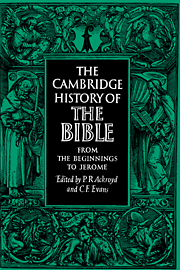Book contents
- Frontmatter
- I LANGUAGE AND SCRIPT
- II BOOKS IN THE ANCIENT WORLD
- III THE OLD TESTAMENT
- IV THE NEW TESTAMENT
- 9 THE NEW TESTAMENT IN THE MAKING
- 10 THE NEW TESTAMENT CANON
- 11 THE NEW TESTAMENT TEXT
- 12 THE INTERPRETATION OF THE OLD TESTAMENT IN THE NEW
- V THE BIBLE IN THE EARLY CHURCH
- Bibliography
- Abbreviations
- Notes on the Plates
- Indexes
- Plate Section">
- References
11 - THE NEW TESTAMENT TEXT
from IV - THE NEW TESTAMENT
Published online by Cambridge University Press: 28 March 2008
- Frontmatter
- I LANGUAGE AND SCRIPT
- II BOOKS IN THE ANCIENT WORLD
- III THE OLD TESTAMENT
- IV THE NEW TESTAMENT
- 9 THE NEW TESTAMENT IN THE MAKING
- 10 THE NEW TESTAMENT CANON
- 11 THE NEW TESTAMENT TEXT
- 12 THE INTERPRETATION OF THE OLD TESTAMENT IN THE NEW
- V THE BIBLE IN THE EARLY CHURCH
- Bibliography
- Abbreviations
- Notes on the Plates
- Indexes
- Plate Section">
- References
Summary
In the field of New Testament textual criticism, as in the study of the text of classical and post-classical Greek authors with which it is so intimately related, a great change of approach and method has taken place in the course of the present century. This may be described, without going into intricate detail, as a change from treating texts in abstraction as literary entities, to a method which views them in the context of history, and relates the changes observable in them to known points in the history of their study and interpretation. The former method tended to seek the existence of specific different text-forms, and to explain their relationship by the hypothesis of definite acts of recension which either preserved or corrupted the original work of the author in question: hence one text was good, and the rest corrupt. The method which is supplanting it very often sees change coming about more imperceptibly, less at some given moment than over a period of time, and recensional activity as always a mixture of insight and error, so that the textually good and bad are to be found in all traditions, and spread in distribution over a far wider period.
FORMER METHODS
The former method owed much to the work of the great nineteenth-century philologist Karl Lachmann, who worked in the fields of the manuscript tradition of Latin classical texts, the New Testament and medieval German poetry. In the first and last of these fields he was often dealing with a tradition preserved in very few manuscripts, which not infrequently were close relatives one of the other.
Keywords
- Type
- Chapter
- Information
- The Cambridge History of the Bible , pp. 308 - 377Publisher: Cambridge University PressPrint publication year: 1970
References
- 2
- Cited by

